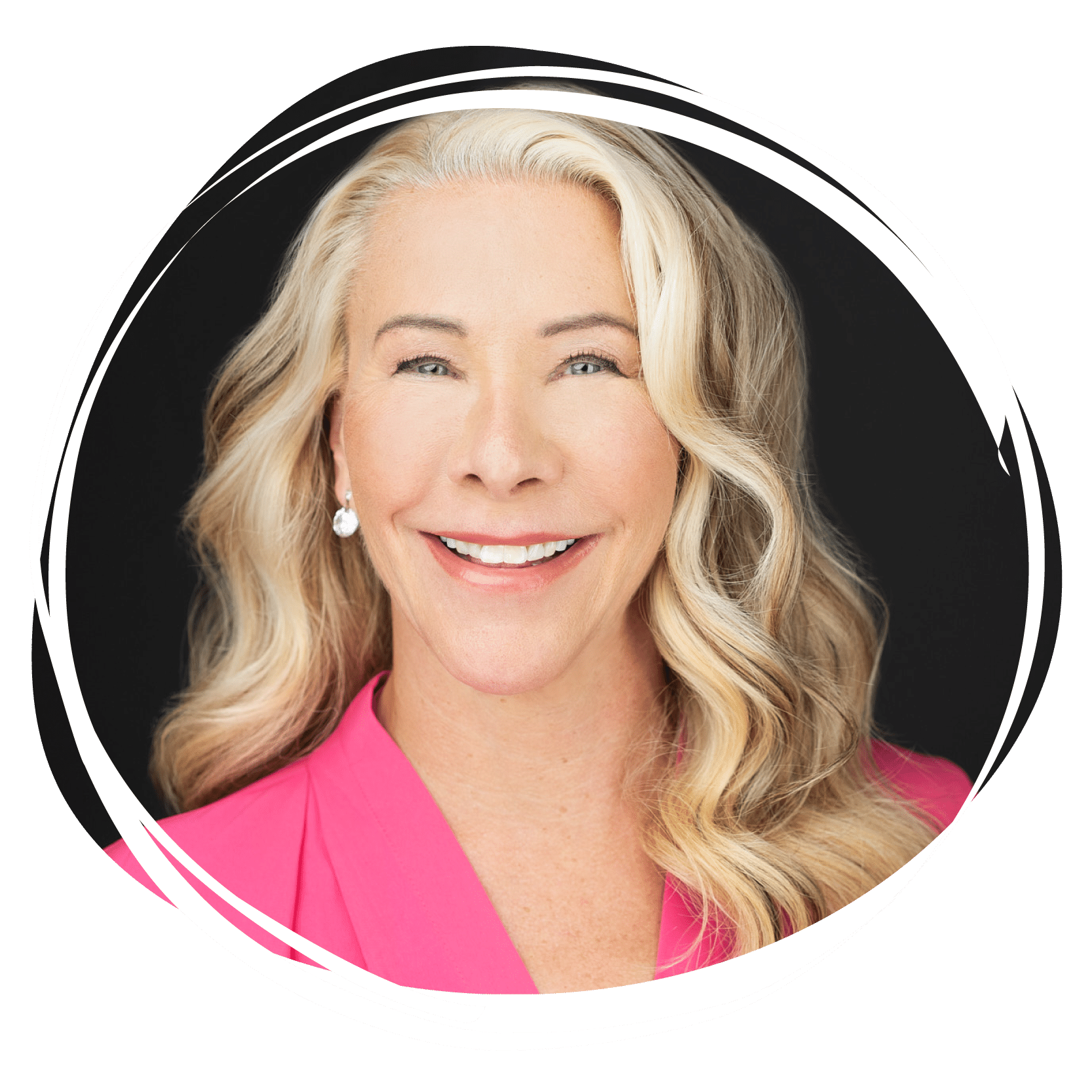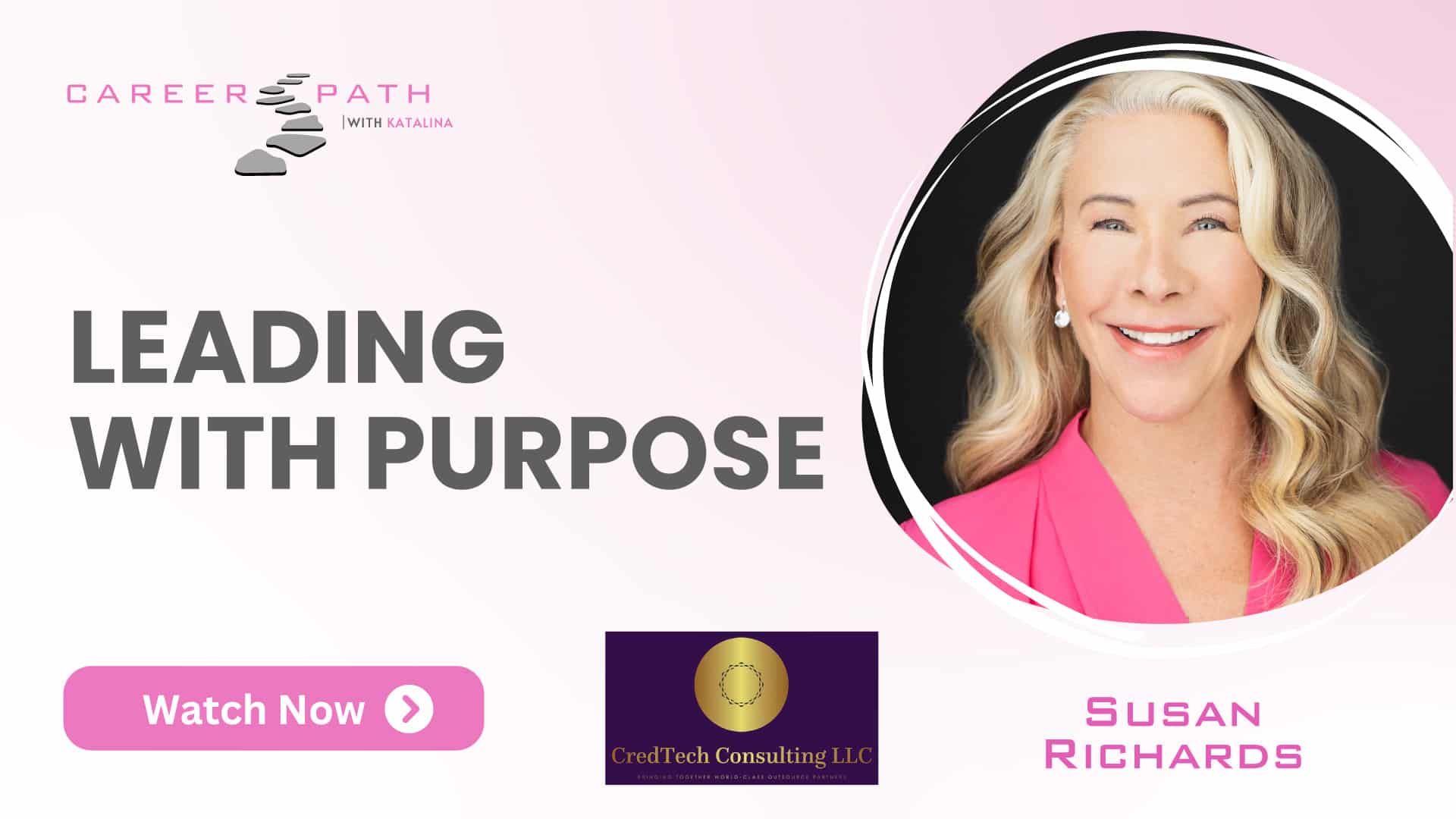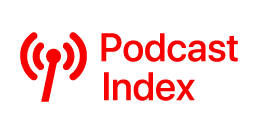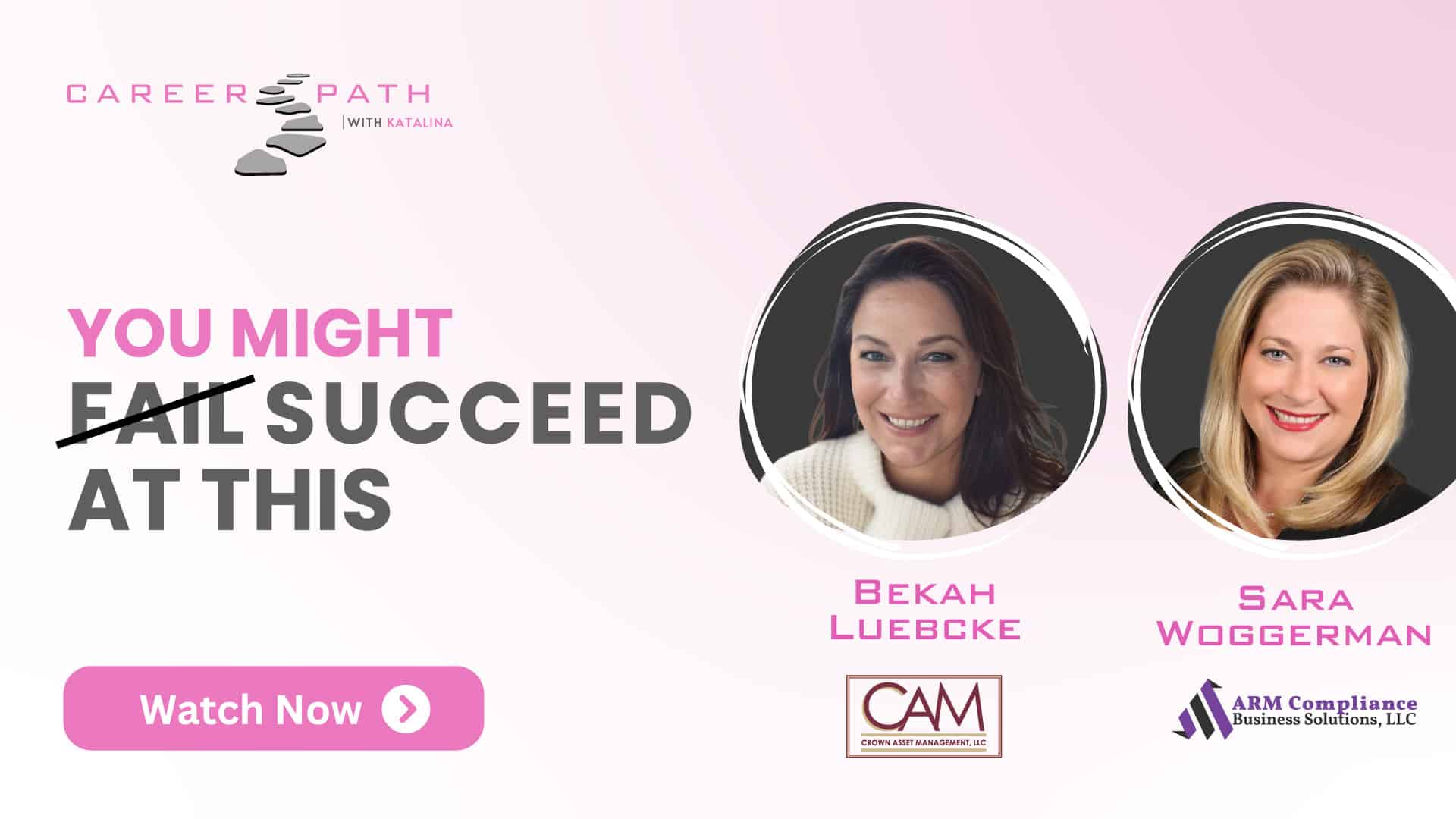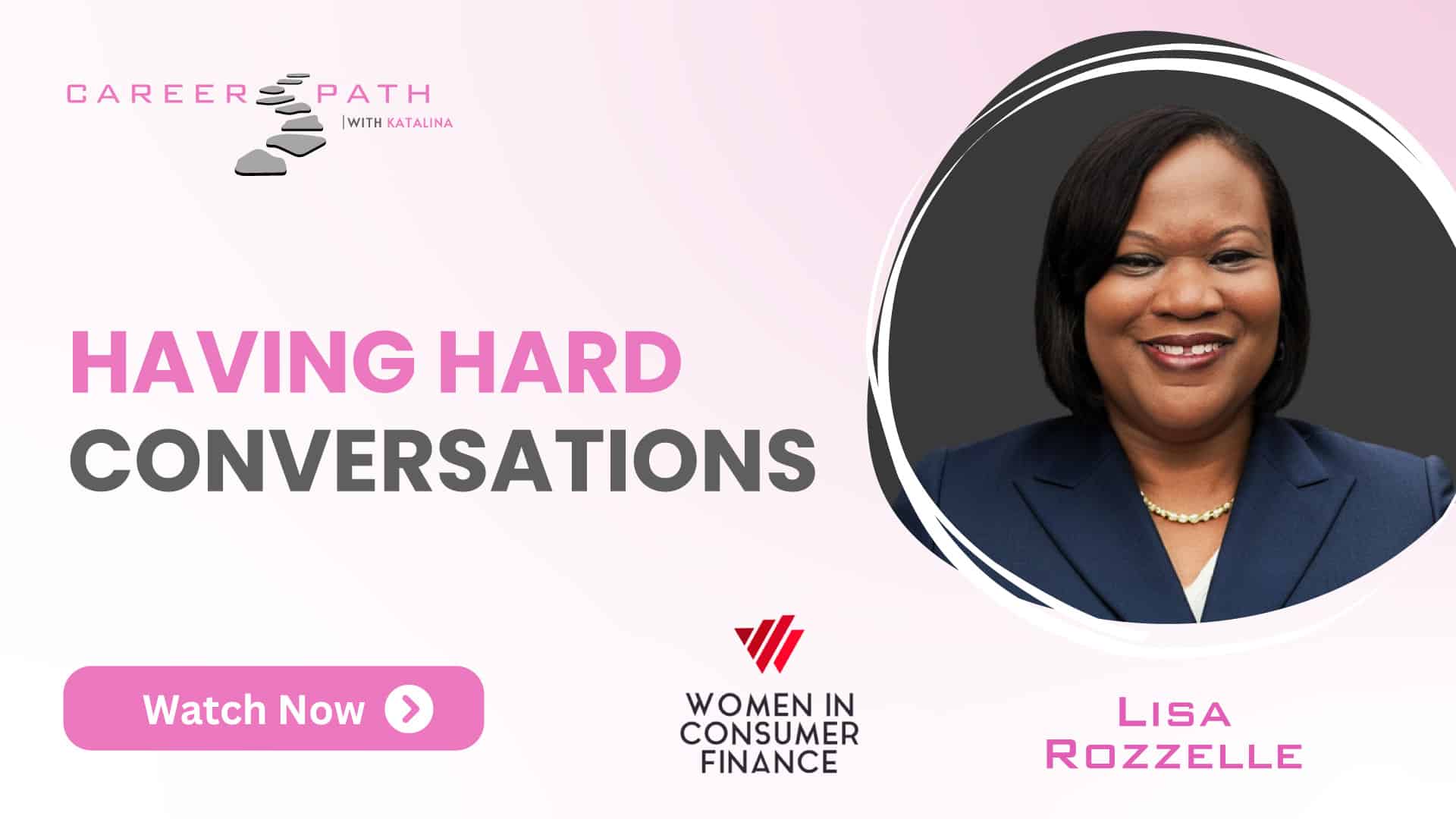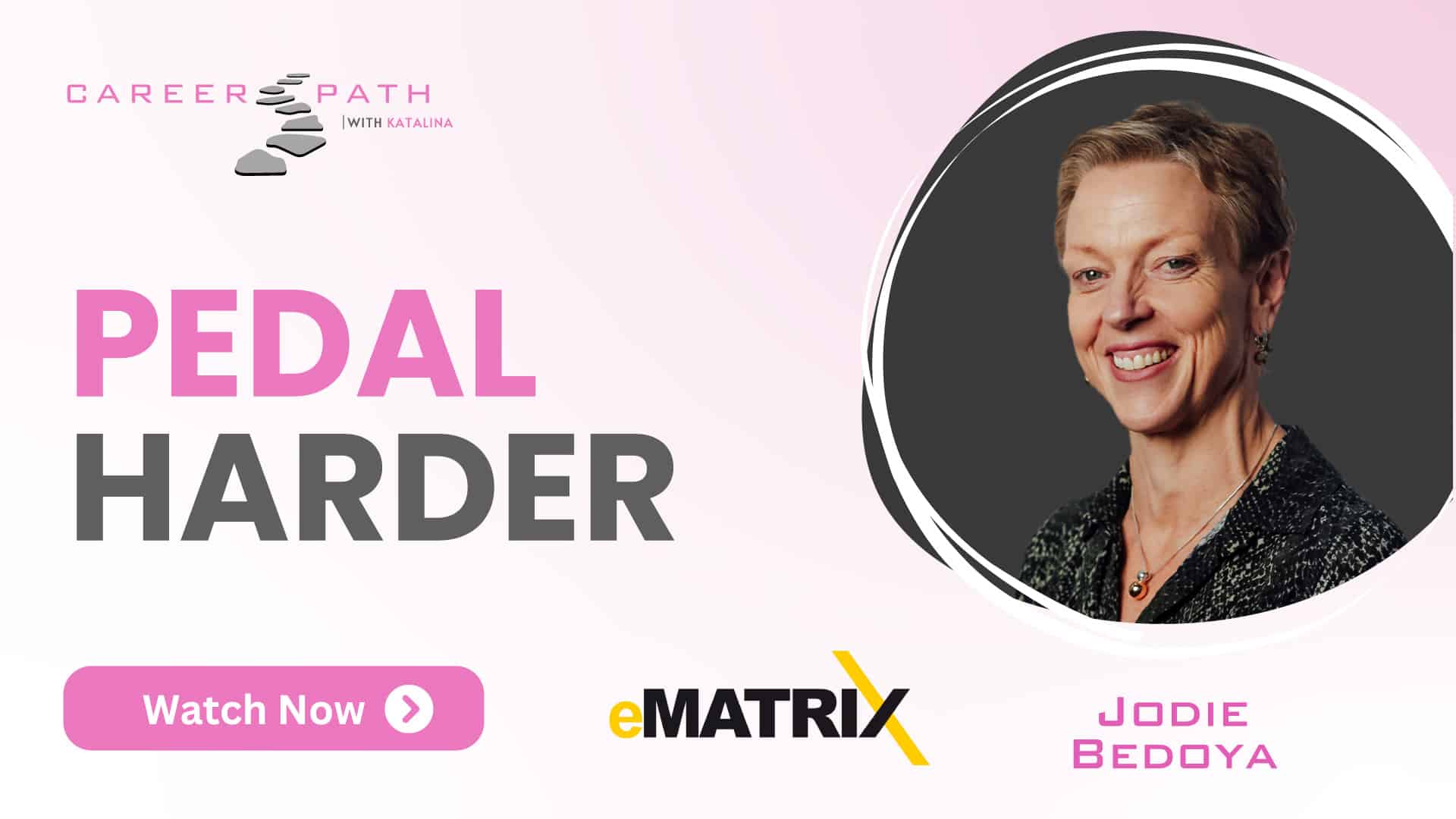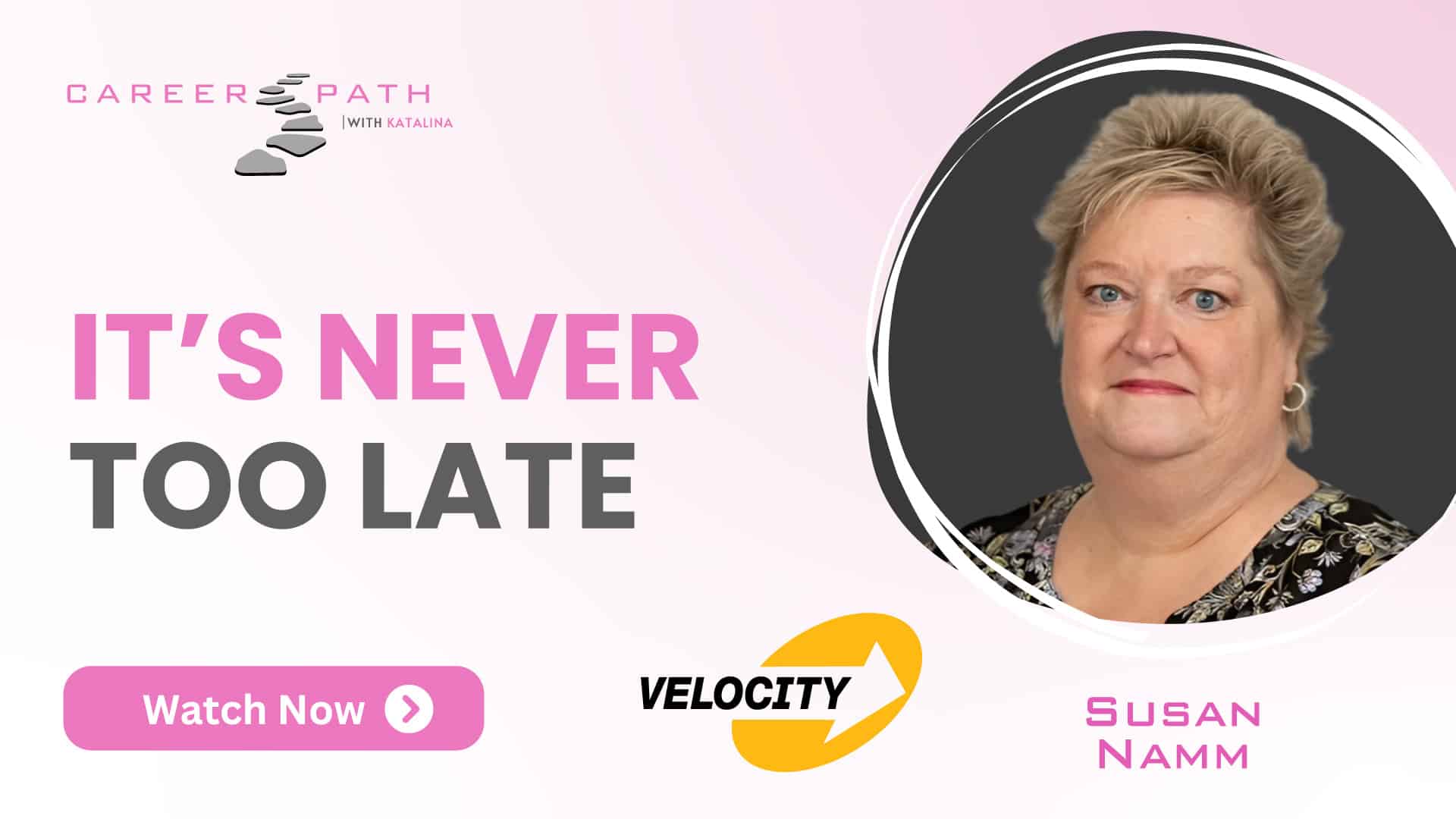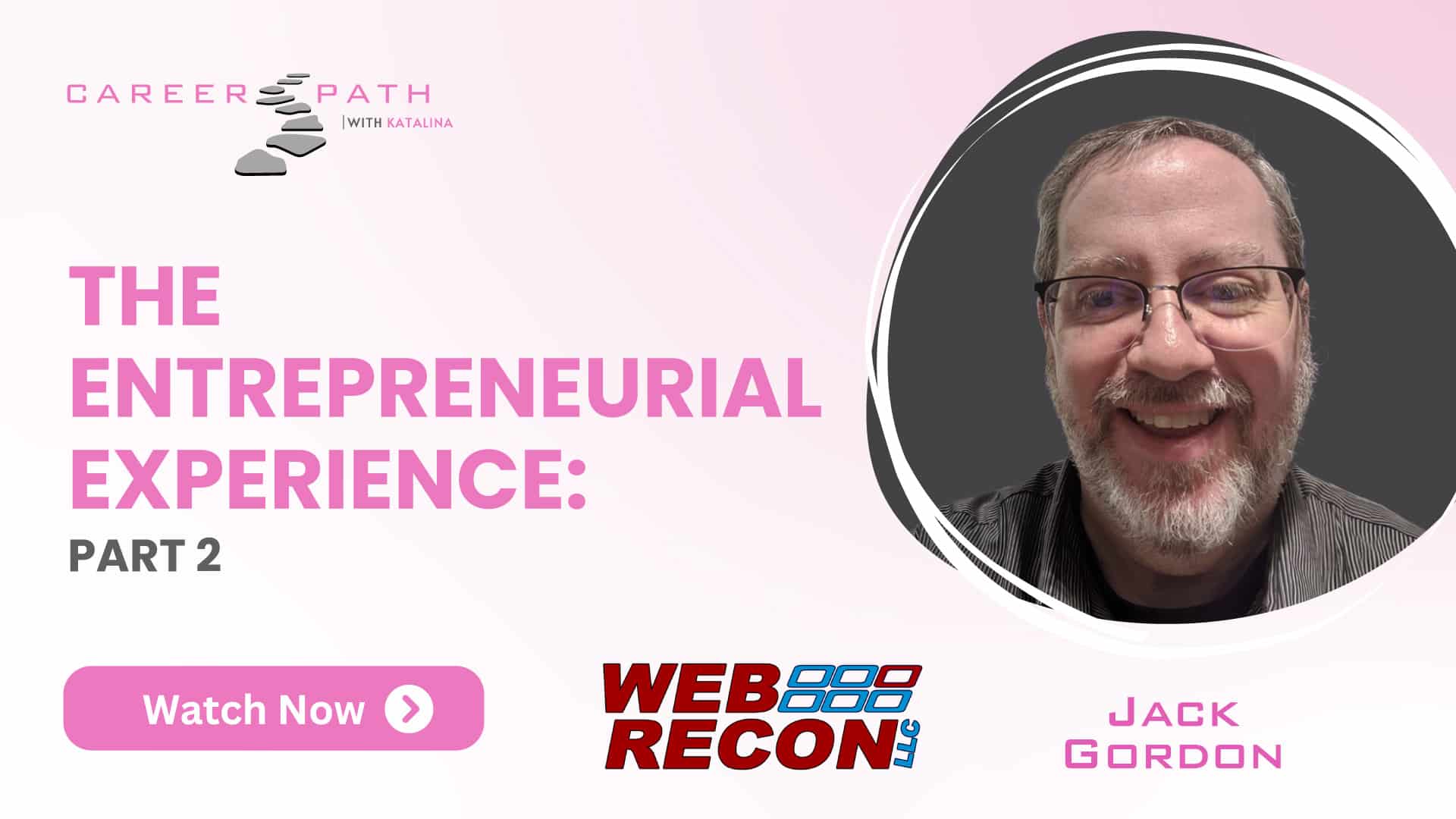Katalina (00:00.856)
Hello and welcome back to another episode of Career Path. I am your host, Catalina. Today I have Susan Richards with me and we are going to be discussing Leading with Purpose. Susan is the founder and CEO of CredTech Consulting where she shares her expertise in the receivables management industry. Susan, it is such a pleasure to have you today. Thank you so much for joining me.
Susan Richards (00:20.879)
Thanks so much Catalina for having me today. I appreciate that.
Katalina (00:24.352)
My pleasure. Well, would you like to get started by telling a little bit about yourself and how you got to where you are today?
Susan Richards (00:31.343)
Sure. Well, 35 years ago, I started in this industry and I started as a collector. I really wasn't planning on staying. It was just a job being a bill collector. And 35 years later, I stayed around and kept going. So I went through pretty much every position in a collection agency and debt buyer. At the end of my career,
NCB, I was their chief operating officer. We had over 500 employees and more or less, I led that organization from going from 25 million, we got up to 125 million when I decided to leave. Leaving, I went to a lot of startups. That was part of my transition. I wanted to go out on my own and give this thing a shot. I went to work for one organization that didn't work out.
No big deal, got involved in another debt buyer and I was right in the middle of COVID. And as you know, COVID, a lot of people didn't have the funding they needed to continue to buy debt. So I said, you know what, let me just take this time and be a consultant and consult to our industry and help collection agencies get like
Katalina (01:39.254)
Yeah.
Susan Richards (01:52.237)
A lot of people need manpower of an operator. want a COO, but they have a COO, but they'd like to get that second look. And that's where I come in and I kind of look at the whole operations from, you know, high level and kind of give them advice on how to take their company from where it is to where they want to go. So that has been a great, that's what I wanted to do and work with.
And another part of it, which I'm really honored to do, is work all the way down to the collection level. And that for me, I'm very much an in the weeds type of leader. So I have no problem helping a collector master their craft. Some people in the US don't see that as a really honorable job, or they don't feel like being a collector is something extraordinary. know, it is though.
because we help consumers get out of debt and we do it in a positive manner and we speak to people like we want to be spoke to. So I think it is a craft. It's sales actually, if you really want to. It's selling, selling people on how to get out of debt. So that's a little bit about where I'm at and how I got to where I'm at today.
Katalina (03:13.558)
Yeah, you have a very extensive background specifically in this industry. And throughout all your different transitions, I know you've had a lot of chances to be a leader. So I'm really excited to talk about this topic with you. And I want to start with discussing leading by example, because I know that is one of the most important things with leadership.
Susan Richards (03:34.031)
Sure, so it was really weird to transition from being on a collection floor with a bunch of other of my friends who I've worked with. When you start working with people over 10 years, they become family to you. So I remember when I first became...
management and I started overseeing some of my friends, stopped talking to me and it was really upsetting. I was like, why aren't you talking to me anymore? They're like, because you're on that side now. And I said, wait, what do you mean? And they said that, you know, it's, it's different now because your management, we don't want to complain to you. We, you know, we, we huddle and complain. And I said, well, wait, I don't want that. I want to do more. I would prefer.
Katalina (03:59.458)
Yeah.
Susan Richards (04:20.619)
us to be more of a put out, not put out the fire management, but fire prevention. So I'm going to keep my office door open. I want you to come in and tell me what's going on. And by leading by example, I was in that collection seat. think when, when people are promoted from within and they've got, you know, they had the opportunity to go through different positions because I went from a collector to a trainer to a
Katalina (04:26.86)
Thank you.
Susan Richards (04:49.869)
to a supervisor, you know, I was in the sales division. I was a VP in the ops. Then I was an SVP in the ops. Then I went to COO. When you go through that whole transition, you know how everybody feels in some way, or form. I always wanted to be heard. When somebody, when I had a problem, I wanted somebody to actually listen to me and not just say, you know what, she's just complaining.
We don't need to listen to what she has to say. And maybe because, and I think this comes into my female, being an emotional leader, being emotional, caring about people, being a mom, I just wanted people to be able to talk to me. And that led for a really good team environment because of being caring about my people, they cared about me.
Katalina (05:20.727)
Yeah.
Susan Richards (05:45.007)
And they cared about me in a way that I always felt like no matter what, together we can get anything done. And it was, I loved that part of my career to be honest. really loved, and whether it was hundred people, 200, 300, it gets a little crazy once it gets past that. But I had people in Jamaica that I was really close to because I helped with the outsource organization and they became an extension of our organization.
Susan Richards (06:14.189)
They call me with what's going on emotionally. Because if a person, my opinion always was the person on the front end, the people on the phone, were the most important people in the organization. They were the people driving the, you know, they were not only handling all the difficult calls, the positive calls, but they were the generation, they were the generator of income. You know, they made the company money.
Susan Richards (06:43.391)
So without them, we had nothing. And no robot is ever going to be able to take away a human emotion. I don't buy it. I think that AI is important, but I'm just saying that from a perspective of what I've seen over the years, when you're dealing with somebody who's in financial difficulty, they're melting down. I I used to deal with people that were feeling suicidal and things like that. You got to knock them off the cliff.
Katalina (06:53.345)
No.
Susan Richards (07:13.421)
And then the collector feeling emotional in the same token. Now I got to help the collector feel confident that they can resolve situations on the phone when they're not doing good. So I think it's leading by example was just being authentic, being who you are, you know, and not hiding behind a title, which by the way, was very difficult at times.
Katalina (07:32.183)
Yeah.
Katalina (07:40.938)
Yeah. So do you think the reason why your friends felt like there was this divide was either from like a misconception that there is a wall between the leadership and the let's call them frontline workers because it could be any industry and ours it is those collectors but those frontline workers versus let's say the corporate or the leaders, executives.
Susan Richards (07:41.649)
I over answered that question.
Katalina (08:10.744)
Or is it a matter of people feeling time and time again that that wall, not just a misconception, but that there has been that lack of communication and there has been a true divide because those people in the executive positions didn't have that ground up experience. Where do you think it comes from?
Susan Richards (08:31.299)
I think everything you just said, all of the above and probably more, but all of the above. think, look, when you're not being heard and there are people that don't listen because they're under stress and they don't wanna deal with another complaining person coming to their door saying, hey, I didn't get the right accounts or I haven't spoken to somebody on the phone in weeks.
you know, or I keep getting hung up on why, you know, and feeling very negative. I used to have a lot of motivational meetings. I really encourage that for any collection agency or any sales environment or any call center. But the divide happens from sometimes ego where people feel like they're better than, I mean, that can be part of it. The other part of the divide is just
Susan Richards (09:29.423)
They, it's that they're honestly, they're overworked. Some of the C level people, you don't really know this because you don't see it. They, they're working from 8 a.m. I mean, I did this 8 a.m. to 9 p.m. at night. They're working Saturdays or working Sundays. All sometimes the front end C's is, they making a lot of money. They're doing all this stuff, you know, they, you know, but they don't understand that there's a lot of weight on your shoulders to.
Katalina (09:50.775)
Yeah.
Susan Richards (09:57.037)
to keep that door open so everybody has jobs. When I sat down with my CEO, Marcella Ada years ago, he was like, you know, when I go to bed at night, this is when he was running NCB, he said, when I go bed at night, it's a lot to deal with when you think of all these mouths I have to feed. you know, was like failure is not an option.
Katalina (10:24.727)
Yeah.
Susan Richards (10:25.355)
It's a lot of pressure. That's why even a good example is even like the president, right? You ever see them when they first start a term and when they end a term? Right? So that's a good example of what I think sometimes the leadership is. And then again, you know, they they don't remember what it was like to sit in the seat of a collector. So I always felt
Katalina (10:33.846)
Yes. Yeah.
Susan Richards (10:49.943)
Like I was there and I was there not to and I'm it and I never separated myself. That was another thing I did. I never separated myself from my team. Some management not saying I don't know all like they get to this position. They think they're the elite and then they move away from their team and then just act in dictatorship way. I never did that. I was always on the collection floor around my people. I told you I might door open.
Katalina (11:12.161)
Yeah.
Susan Richards (11:19.417)
But I never, could have put myself on the third floor. I could have, I was offered that opportunity. And I said, no. I said, I want to stay with my team because together we, I say this is true though, together we stand divided we fall. And I felt that way. So yeah.
Katalina (11:24.568)
Yeah.
Katalina (11:34.581)
Yeah. And in that sense, you keep your finger on the pulse. You're not separate and don't know what's going on. You really have a feeling of every single day where people are at, where the entire floor is at. And what you were talking about reminded me of a previous job I had. This wasn't in this industry. And I'll talk vaguely because I don't like to talk badly about my past jobs. I did love this job, but there was a problem where there was a huge divide between the corporate
and everybody on the front lines. And we had corporate come in at one point and implement the most ridiculous rules that we were like, you're making our job functionality so hard. So for example, they took away, we had in the back room, there were some tables and chairs. And the reason was because we had to sit down and actually do a tactile task at those tables and chairs. And we were doing work actively.
or you needed to sit down for it and use your hands, they took them away because they thought it was lazy. They're like, we don't want you to have tables and chairs and you just go in the back room and sit down. And they took them all away. And we all had to sit on the floor to get our jobs done. And our backs were hurt. We're like, this is ridiculous.
And there was that divide where corporate made a rule and they just, they took it. And another thing they did was they took, we had like little aprons to carry things around for tasks that we were doing. And they said, we don't like that as part of the uniform. We don't think it really fits. So we're gonna take that. But they didn't realize that on the floor, the amount of things we had to carry, a person physically can't carry. You had to have like pockets.
and they took our pockets and suddenly our production went down. It was just terrible, but they never had a finger on the pulse. They didn't show up and see what we were doing every day. So they made these decisions and it didn't work. They weren't leading by example. They weren't understanding what the front lines did before they made decisions. And it was a mess, mess to say the least.
Susan Richards (13:40.643)
You well, you bringing that up, if they would have done what I'd like to do, and I'm not saying I'm the best leader on the planet, but this is one thing. I never made a change without the team's input. Now, so what I would do is I would take a group of all frontline and we would have a round table and I would say, good, hit me with your ideas. Here's our goals. This is what we need to do. I want to know what you think.
Katalina (13:55.199)
We
Susan Richards (14:09.849)
we can do to get there. And by taking input from them, then they wouldn't make them bad decisions. Like first off, that's terrible to sit on a floor. Like what are they?
Katalina (14:20.16)
it was. And we had one of our one of my coworkers was pregnant and another one had a messed up leg. I don't know if it was a fracture or what. we're like, even just for them to take away a chair for them to sit in the back. It was just ridiculous. Yeah, it's terrible.
Susan Richards (14:35.407)
That's terrible. Yeah, it's totally terrible. I've never looked. So that's because they didn't have their finger on the post. They weren't asking questions. And then taking away an apron that could have, you know, your work effort was quicker because you had all your tools available to you. Again, having a roundtable with their people, they would have figured out that this is a necessity. It's not how it looks. It's that it's great efficiency. It gets the job done.
Katalina (15:05.28)
Absolutely. Instead, we had to run back and forth to the room all the time. like I said, the productivity went so down, we weren't able to do the same amount in a day.
Susan Richards (15:14.703)
Timing, yeah, time is money, So yeah, they weren't thinking. that's terrible.
Katalina (15:17.112)
100%.
Katalina (15:21.974)
So I want you touched on it a little bit ago, this idea of being that authentic leader is having vulnerability. Can you talk a little bit more about that?
Susan Richards (15:31.504)
Yeah, so I'm laughing because I've lots of stories, but the one story that comes to mind is, like, as an authentic leader, you take, they used to always joke that I would be the one going to the third floor, where the corporates met, and you kind of went over statistics and numbers and things that you were doing good and things you weren't doing bad. So when you had a bad month,
I was the one who took the brunt of that. So there was times where you would go, you know, I would be hearing how poor we did, you know, and wasn't a lot, but it was. And there's times, I mean, being real, we are gonna fall. I mean, we're not always gonna fall, you know, we're not always falling. We fell forward, but I learned that from somebody else, but we fell and we learned from our mistakes.
But I would take the brunt of that and then I would come back to my office and probably close the door and cry and then then open it up like everything was fine and hey everybody, even though we had a bad month, we're gonna do well. But I was emotional too. There was times where I had, and I'll think of this other time when I sat down and had, I didn't sit down, I had one of these motivational meetings and I got so emotional about it that I I teared up.
And my team and I felt like so weak after that meeting. I was like beating myself up. I walked away going, my God, I can't believe I allowed myself to get that emotional about it. I should have acted like a man and then all like, yeah. And I can't because that's not who I am. Well, my team was so moved by my emotions that they wanted to do better for me than ever. They're like, that was the best meeting we ever had. We felt your emotion.
Susan Richards (17:21.581)
And I didn't feel that. I felt the total opposite. I felt like a weak leader. didn't feel like I was, you know, cause how could I allow myself to get that vulnerable? But guess what? They pulled me up. They let me know it was okay. They let me know it was so okay that we outperformed that month because they were so driven to do so well. And it gives me chills thinking about how great, you know, that whole team was. So it was just.
Susan Richards (17:50.123)
I had an ultimate team, but I think, anybody, by the way, we also did one other thing, which I thought was great, was we had what's called leave no collector behind, and just call it leave no employee behind. We never allowed a new employee to feel alienated. You know how sometimes when you start a new job, and everybody's like, the outsider looking in, especially if it's a family environment that you're really close to one another.
Katalina (18:10.348)
Yeah.
Susan Richards (18:18.433)
I didn't want to allow that. wanted everybody to feel a part of. I wanted everybody to have a shot at whatever it was, goal-wise. So we did a lot of that as well. But I think that's part of being that emotional, again, remembering how it feels. And sometimes people don't lead by the emotional side. And I saw the value of that.
Katalina (18:43.756)
That's fantastic. I love that your team rallied around you. How do you build? So when you're in those situations where you're struggling, whether the company is struggling, you're struggling personally, or you've gotten negative feedback as a leader, how do you build resilience?
Susan Richards (18:46.798)
Yeah.
Susan Richards (19:01.603)
Well, mean, you build resilience. It's kind of like building a house, you know, the walls or some of your other leaders, right? So just because I might be not doing so hot or maybe part of my team might not be doing so hot. Everybody's not doing terrible at the same time. building resilience means building foundation, a strong foundation of taking people. And all my leaders were empowered to make decisions.
I didn't make it that if I didn't make the decisions, we're not making the decision. I've made it very clear that if you think it's a good idea, I want you to go with it. I'll own it if it fails because a good leader owns the failure. They don't go point the finger at everybody. I already gave you the empowerment. Take it, use it and try to think before you act because I know what it's like when you fail.
Katalina (19:45.559)
Absolutely.
Susan Richards (19:57.035)
So I used that and we were very vulnerable in these meetings. We'd have conversations. But if you think of a house and if all four sides are strong, even if you take a cat one hurricane, which I know that's a terrible thing to say, you're not, maybe you're losing a couple shingles, you know, or a couple, you know, part of your roof. You're not losing the entire house, you know, because you have built a strong foundation. So I think that's the resilient side.
Katalina (20:20.235)
and
Susan Richards (20:24.161)
of building strong leaders that surround you.
Katalina (20:27.5)
I love that. And I'm going to add something else to it that I've been learning in a quote that I try to remember every single day. I know I talked about this. may have been the last episode or it was the episode before that. So I talked about it recently in Career Path, but it's a quote from Gary Vee, if you're familiar with him. And it's something along the lines of, not going to quote it exactly, but the best way to like build that resilience against
Susan Richards (20:44.931)
Yeah, I love him.
Katalina (20:54.244)
the thought of failure is to wake up every day knowing that you are going to mess up. You just are. And so if you just accept that, you're able to move forward and you're able to better learn from those mistakes and your resilience will slowly grow. So I love that.
Susan Richards (20:58.819)
Yeah. Yeah.
Susan Richards (21:10.371)
And you know what else Gary Vee said that I'll just add to that quote, which I love, as a leader, he said, never expect your team to do what you do. Leaders fail when they expect their team. So just because I have to work eight to nine at night doesn't mean my team has to, right? Because I chose to take on this leadership role, which means I'm going to do more. But the minute I expect others to do it, it's...
That's not good leadership. I took that tip from him and lived by that one. Yeah.
Katalina (21:39.384)
I'm not.
that one. Yes, I remember watching him say that it's a great one. Now to kind of piggyback off of that, what are the different other qualities like that? I think that is a huge quality for a leader, but what are other qualities that define a really good leader?
Susan Richards (21:46.19)
Yeah.
Susan Richards (21:57.145)
Well, if you don't have anybody following you, you're not gonna leave, right? So that's first and foremost. Like you could be the best leader in the planet, but if you have nobody that honestly believes in you or so it's not, it's an honor. I used to always say this to my team. It is an honor to be leading this team because you're allowing me to do it. Because without them, I don't have anything. So I think that was part of
Susan Richards (22:25.677)
me letting them know that they're in control in a lot of levels, really are. And it's either we're gonna do well, especially in call centers, because again, it's not the amount of widgets you're doing. It's not like, this is people. So people helping people helping people. So it's all about emotions and people. That's what we're in. This industry is all about people.
Even though I know we're getting into the AI and technology, we're still dealing with people. So I think part of leadership is understanding who you have in front of you, knowing your people, knowing your weaknesses. You said it, honoring the idea that every day I'm going to fail. Something's going to happen. I'm going to fail. But I'm going to, I got this from, I think, Denzel Washington. I think he's the one who said fall forward. Don't fall back.
because if you fall forward, you're still going forward. I always love that. Yeah, so I look at, I never was afraid to fail. I was when I first started and I'm not gonna, I mean, I used to always want to be perfect. That doesn't work. And I learned that you embrace your mistakes, try not to repeat them. There's times I did for sure. I definitely repeated my mistakes. But.
Katalina (23:25.012)
Yeah, that's great one.
Susan Richards (23:47.853)
I remember sending, like, I'll just give you one example of something I learned the hard way. Don't ever email emotional stuff. When you're mad, don't start writing away. Like, that's never good, you know? And people do it, and I used to find myself talking to my leaders and saying, that's not the way to react to teammates, right? So I think I...
Katalina (24:02.668)
Thank
Susan Richards (24:14.569)
I hope I answered your question, but I think leading is a matter of time, time of growth, getting better at what you do. Every day is a new challenge. at everybody from, sometimes you gotta look at them from a high view, sometimes you gotta get back down into your seat. So being flexible, not being rigid. I used to joke a lot too, I would make it very light.
for people so they felt like I was personable where they understood that they could come talk to me. But again, stick by the, you know, don't put out the fire management, stick to fire prevention. And if you're involved all the time, you won't have fires coming up all over the place. Yeah.
Katalina (24:58.296)
again.
Katalina (25:03.586)
That's great. I want to pop back to what we were talking about briefly with the failure and the falling forward. I would say I'm still afraid of failure, even though I embrace like that, that Gary V quote, but I would define them differently. there's, there's failure and then there's messing up.
And when you mess up or when you fall, you can fall forward. And that's by learning from it and so forth. I still feel failure, but I think my definition of failure, the more I go through my career has honestly changed. It originally was messing up, was failure to me. And now it's like, no, failure to me is not getting back up.
or not trying to begin with. There's a great visual I saw where it said it was like an archery target with like arrows and it said, this is not failure. And they weren't hitting the center of the target. This is, and it was the target, but the arrows were never even shot. They never even tried and they never picked up and they never practiced. So I think there's that difference there that
has taken me a long time to learn and I'm still embracing it but I'm like true failure is not getting back up is not learning from your mistakes and is learning from your mistakes and is not trying versus messing up where you can fall forward so that's I feel has changed for me.
Susan Richards (26:28.335)
You know, I went through probably in the last 10 years, my biggest, I would call it failures, where I got leveled, lost everything personally, know, everything that could go wrong went wrong. And I used to have these motivational meetings of people that went through major trauma in their life and they came out like the Phoenix rising. And I remember talking to a couple of the folks that saw me go through a really
Susan Richards (26:58.819)
worst time of my life. I came out of it and they said, but during it, I used to say, my goodness, like here's all the motivational means and all the, cause I used to have a lot of like things from YouTube, you know, these people that have gone through hell and back and looking at, wow, look, if they can do it, we can do it. It was supposed to be inspirational. Well, here now all of a sudden I'm in this and I'm like,
Katalina (27:00.16)
Yeah.
Katalina (27:23.767)
Yeah.
Susan Richards (27:27.533)
I got to practice everything I've learned. And I'll tell you sometimes, Kenneleen, that was the hardest lesson. But to your point, I never gave up. And I knew that if I kept moving forward, even if it was baby steps, even if it was just getting up and then stepping forward, I knew that it would get better. And then it would get better and then a little bit better. And then all of a sudden, you know, it's kind of like a train. You get it going, you keep going.
and full steam ahead. And I'm not afraid to go off track anymore. I'm not. I think what I went through, that was probably the worst thing I could ever go through, but it was a great learning experience for me. If you asked me several years ago, would I say that? Why not? I was in it, but I was always positive and I always said, no, I'm gonna get out of it. I wanted to...
Katalina (27:58.998)
at one time.
Katalina (28:14.293)
Thank
Yeah.
Susan Richards (28:24.483)
This was more for my kids to show my kids that you know what, you can go through, you can lose everything, everything, and you can come out of it. You can. And I wanted them to see that as.
Katalina (28:36.106)
You broke up real quick. you say that again? said you had your food.
Susan Richards (28:39.279)
yeah, I said this to my kids, can you hear me okay? Yeah, I said to my kids that no matter what, I wanted them to see their mother, even though she went through, because I went through a divorce, I went through like losing, know, houses and things and things that, you know, that I wanted them to see that even through all this loss that you can get back up.
Katalina (28:42.23)
Yeah, you're back.
Susan Richards (29:06.861)
That was the scary, you know, scary thing, you know, losing jobs, losing houses, losing husband, you know, everything at once, and then coming out of it and saying, look, and you know what else it shows you too? Consumers, which again, now I'm gonna flip back to collections. We need to think about this. And I used to always say to my collection team, if you lost it all, what would happen? How would you feel? Of course you're gonna feel emotionally crazy.
everything's going on and you have to figure that out. You wouldn't want somebody yelling at you on the other end of the phone. That doesn't solve, you know? So yeah, because you're just emotionally erect. I didn't get anywhere like that, but it was enough for me to wake up and say, you know what? The universe, God, whatever gave me this to become more resilient as a woman.
Katalina (29:46.035)
That's last thing you need.
Susan Richards (30:04.281)
as a Peter, as a person, because sometimes you need that. You need to be pushed down to get back up. You really do sometimes. Although I don't want to go through it again, but.
Katalina (30:16.984)
Fair, fair. Well, Susan, thank you so much. Unfortunately, we are running out of time, but I want to thank you for sharing all of your expertise, your insights, and your experiences with me. It was great to have you on today.
Susan Richards (30:28.751)
Thank you so much, Kalina, for having me. I appreciate it.
Katalina (30:31.808)
My pleasure. And to our listeners, if you have any questions, comments, or topics that you would like to see us address, please leave them in the comments below. We will try our best to get to all of them. Otherwise, we look forward to seeing you in our next episode.

